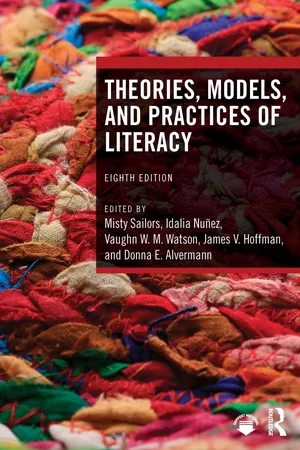
Theories, Models, and Practices of Literacy
- English
- ePUB (mobile friendly)
- Available on iOS & Android
Theories, Models, and Practices of Literacy
About this book
This eighth edition of Theoretical Models and Processes of Literacy, a foundational text in literacy research, is updated to represent a new era in contemporary and critical scholarship. With a revised name, the intentional inclusion of diverse perspectives, and new organizational structure, Theories, Models, and Practices of Literacy thoroughly represents the theories that drive literacy and the scholars who write about and within the field.
While still representing the most comprehensive source for connecting theories to literacy research and practice, this eighth edition builds on preceding editions, contextualizing its historical roots, promoting and highlighting contemporary and critical theories, and envisioning future directions in literacy. This volume addresses theories across ten sections, including early, youth, and community literacies; teaching literacy and literacy teacher education; dis/abilities and disciplinary literacy theories; digital and multimodal literacies; and the disruption of colonial boundaries in language and global literacies. The chapters in this volume are curated to inspire the interrogation of literacy theory and foster its evolution. Additional archival essays from previous editions will remain available as Support Material on the book's webpage.
New to the eighth edition:
• 80% new material (and significantly revised previous materials) to reflect emerging and contemporary theories and scholarship.
• A more globalized approach to theorizing literacy practices, including those with onto-epistemological perspectives rooted in people's lived experiences, literacies, and languages to engage scholars and audiences who may be new users of the text.
• Focus on theories that actively challenge traditional theoretical literacy frames and raise critical consciousness toward communities marginalized by the "white gaze" historically represented in literacy theory, literacy research, and literacy education.
• New avenues for readers to explore how theory informs practice, practice informs theory, and how both are "taken up" in various contexts (e.g., classrooms, schools, communities, and societies).
Frequently asked questions
- Essential is ideal for learners and professionals who enjoy exploring a wide range of subjects. Access the Essential Library with 800,000+ trusted titles and best-sellers across business, personal growth, and the humanities. Includes unlimited reading time and Standard Read Aloud voice.
- Complete: Perfect for advanced learners and researchers needing full, unrestricted access. Unlock 1.4M+ books across hundreds of subjects, including academic and specialized titles. The Complete Plan also includes advanced features like Premium Read Aloud and Research Assistant.
Please note we cannot support devices running on iOS 13 and Android 7 or earlier. Learn more about using the app.
Information
Table of contents
- Cover
- Half Title
- Title Page
- Copyright Page
- Table of Contents
- Acknowledgments
- Editor Biographies
- Preface
- Section 1 Introduction: Disrupting Colonial Boundaries through Theories of Languaging
- Section 2 Introduction: Young Children’s Literacies
- Section 3 Introduction: Youth Literacies
- Section 4 Introduction: Disciplinary Literacy
- Section 5 Introduction: Home and Community as Sites of Critical Literacies
- Section 6 Introduction: Literacy Teaching and Literacy Teacher Education
- Section 7 Introduction: (Re)Theorizing Reading Disabilities
- Section 8 Introduction: Futuring, Pasts, and Presence: Digital Lives, Worlds, and Literacies
- Section 9 Introduction: Transglobal, Multimodal Lives, Texts, and Literacies
- Section 10 Introduction: Global Literacies
- List of Contributors
- Index